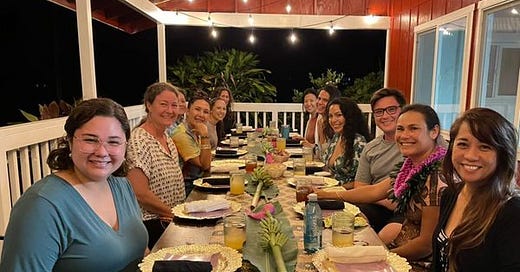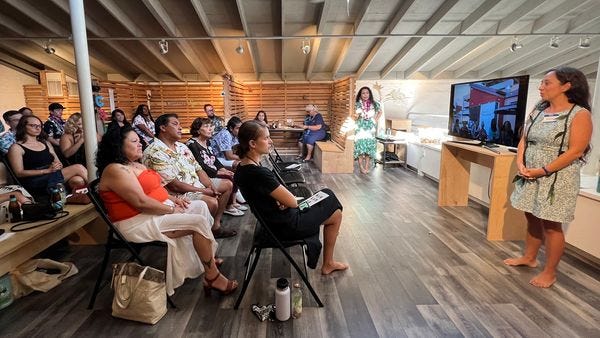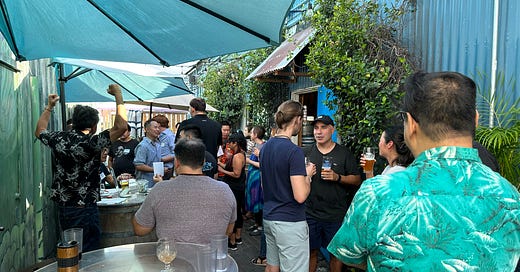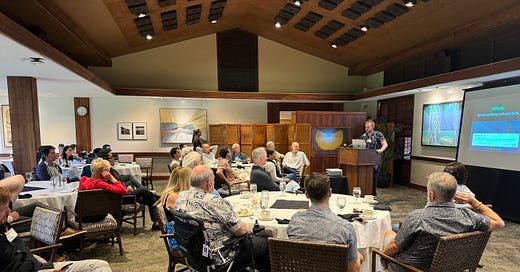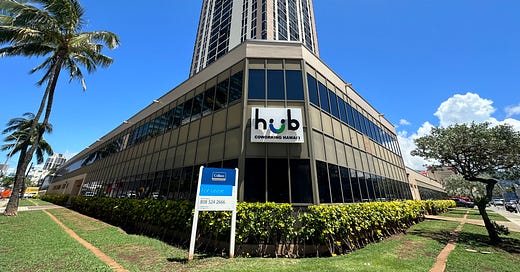
FoundHer selects second cohort of island women entrepreneurs
Are you reading Hawaii Bulletin on the web? Did a smart and good-looking friend forward it to you? Be sure to subscribe today to receive every issue directly in your inbox!
Hawaii FoundHer, a business accelerator for women entrepreneurs of Native Hawaiian, Asian American, and Pacific Islander (NHAAPI) ancestry, has announced the members of its second cohort of five female founders and their companies.
Remarkably, like last year's group, this year's cohort is again drawn entirely from islands other than O‘ahu.
I've written about FoundHer before, so if you're not familiar with the program, it's worth a visit to the Hawaii Bulletin archives. Operated in partnership with Purple Mai‘a, the first cohort kicked off last October. Nobody knew what to expect at the end of the six-month program, but when their accomplishments were celebrated in person in March, there wasn't a dry eye in the packed house.
I was able to check in with HawaiiFoundHer Director Darien Siguenza—recently elevated from program manager, and now joined by new program coordinator Angel Permito-Kaheaku—to get an update.
First FoundHer founder metrics
"I was so excited to see how well our first cohort has done," Siguenza said. "Our plan is to collect a full year of data, and we still have one more survey to send out, but we saw a lot of business success as well as a number of individual achievements."
To recap, the first cohort of FoundHer companies included ʻĀina Organics (Grace Young), Hawaii Farm Trails (Kālisi Mausio), Kōkua Diaper (Melelani Jones), Polipoli Farms (Lehia Apana and Brad Bayless), and Waimea Herb Co. (Malie Sarsona).
"In just the six-month period of the program, 12 new hires were made—eight of them Native Hawaiian and one Pacific Islander, four of them mothers," Siguenza reported. "And the companies are achieving an average 270 percent growth in comparison to the year prior to joining the program."
The companies were able to focus on product development and increasing production capacity, she added, which allowed them to produce more product, and therefore land some key wholesale accounts.
"Other than the numbers, though, I think one of the biggest achievements was the bond and connection that was really built between the women and everyone that was involved in the program," Siguenza said.
"They're all very different have very different backgrounds, so they were able to share their skills, give different perspectives, and support each other," she added. "Just like being able to talk about the daily stresses of juggling a business, being a mom, and being busy with a million different things... I know that for all of them, that was one of the top things that they mentioned was of the highest value for them."
Siguenza said that bond is still there, and that the founders have all shown interest in providing support to future program participants as alumna. In fact, past participants will be able to have access to some of the programming of this next cohort, especially as the curriculum continues to evolve.
Selecting the second set
The plan was to keep the same annual cadence from year to year, though it did require the FoundHer program to raise enough funds in time.
"Thank God, we were able to do that," Siguenza said, crediting the efforts of FoundHer's founders Isabella Hughes and Gloria Lau and their extensive networks.
The call for applicants went out in June, and more than 200 teams applied. About a quarter of the applicants met the core criteria, and after dozens of interviews, eleven finalists were selected.
"I wasn't a part of selecting the finalists, the review committee was all external," Siguenza explained. The committee included Hughes and Lau, Mausio, Caroline Landry, Ola Brew co-founder Naehalani Breeland, and Tiffany Huynh of the Elemental Excelerator.
"They were an amazing group, from really different backgrounds and all different industries, and this group of really amazing women kind of landed on the same choices for who would be a cohesive group and who would be able to take the most advantage of the program," Siguenza recalled.
And while it wasn't a conscious decision, none of the cohort members that were chosen were from O‘ahu.
"It was just based on the strongest companies, so it was just awesome to see all the innovation on the neighbor islands," she said. "We were just super impressed by that."
Siguenza said that the first cohort drew a lot of applicants in agriculture and food systems, from farms to restaurants.
"The the applicant pool was very different this time," she said. "We saw a lot of health and wellness—fitness, spirituality, spas, like anything that you could think of—and then probably second to that would be fashion and beauty."
"It's super interesting," she continued. "I'm wondering if that arose coming out of the lockdown and pandemic, with a lot of desire for more of those things."
The five for 2022-’23
The five companies and founders selected for the second FoundHer cohort are:
Iwi Nails (Molokaʻi) by Lihau Willing: Hawaii-inspired designs on gel nail strips that are easy to apply and long lasting.
[Ep-ik] Style (Molokaʻi) by Sydney Kalipi: Breathable, skin like activewear for women.
Kamuela Gourmet (Hawaiʻi Island) by Dore Centeio: Small-batch handcrafted granola and muesli.
Island Swim (Hawaiʻi island) by Lilinoe Wedemeyer: Handmade Tahitian pearl swimwear made with natural rubber elastics and recycled materials.
Haʻa and Co. (Kauaʻi) by Maliana Hamada: Nostalgic scents of Hawaii. Light and aromatic, non-toxic and vegan room sprays.
"All the women are very different personality wise, background wise, and their reasons for starting a business is very different for all of them, but at the same time, I feel like they're really at complimentary stages in their development," Siguenza said.
"They're just all at that point where they've seen that organic growth, they have a following, they love what they're doing, but they need like an influx of capital and mentorship to figure out how do they scale," she continued. "They want to do good for their families, their communities, and for Hawaii."
In terms of goals, some have their eyes set on a statewide market, others on a national scale, and even international reach isn't out of the question. But Siguenza said she's impressed by how far many of them have gotten on their own.
"Take [Ep-ik] Style and Sydney Kalipi, she wanted to start this clothing line but she got a lot of pushback—she had a lot of people doubting her, doubting her ability, telling her that it wasn't going to work out," Siguenza said.
"But she got connected with the founders of Kealopiko, they mentored her, she took some classes, and now she's creating all these pieces by hand where the quality is really impressive," she continued. "She took the initiative to create this business on her own, to get mentorship on her own, to learn these skills on our own—and now she's actually teaching sewing classes to students in high school.
"She was being doubted, but she took the initiative, and even as such a young business, she's already paying it forward," Siguenza said.
What's next for FoundHer?
The second FoundHer cohort had its first virtual orientation last week. Later this month, the focus will be on business basics, with one-on-one time with HR professionals and accountants. And the main program runs from October through March.
One new initiative that Siguenza teased was a possible "holiday market" at the end of November, although the details are still being hammered out.
"We're putting together this market to, of course, provide exposure and sales for our current cohort and our alumna, but we also want to invite the women that applied to the program to participate as well," she said.
"There were some companies we saw that were too early stage, and others that were too advanced, but there were a lot of gems overall in different industries that were worth working with," Siguenza explained. "So let's put them all on a platform and give them exposure."
Even more tantalizingly, Siguenza said FoundHer might be able to partner with a mainland accelerator to strengthen and broaden the reach of its mission to serve Native Hawaiian, Asian, and Pacific Islander women.
"It's in the works," she said. "That's all I can tell you right now."
For now, Siguenza is more than fulfilled with the work at hand.
"This has just been a really life changing role for me," she said. "Just being able to witness a woman starting off with an idea, just wanting to support her family, and then it ends up turning into something so much bigger," she said. "It's just so exciting to see them go from a point of survival mode to creating something that's like abundant for themselves, and for their families, and for their community."
"It's just been an incredible journey, and I'm very, very excited to see what happens this time around," she added.
https://join.slack.com/t/hawaii/shared_invite/zt-lvudhfgm-65TFeCxlcNs2wWqHMTUVtg


